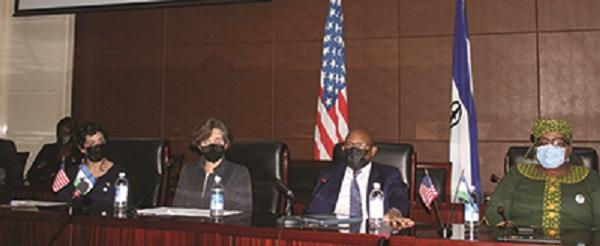Africa-Press – Lesotho. The government of Lesotho has finally secured the lucrative multi-billion Maloti Millennium Challenge Corporation (MCC) Compact II on Thursday last week.
MCC has committed $300 million (M4.8 billion) towards compact programs, and Lesotho has pledged $25.5 million (M365 million). This approval is a culmination of several negotiations between the government of Lesotho and the MCC Board.
In December 2014 Lesotho was reselected for eligibility by the MCC Board but the renewal was mired by constraints following complaints by the United States (US) government over human rights abuse that was rampant in 2015.
MCC approved Lesotho’s eligibility back in 2017 and negotiations began from 2018. The government then had to pass some reforms crucial to the compact including those that address gender equality, working conditions, improve its status of trafficking in persons (TIP) from tier 3 to tier 2.
In preparation for the signing, the parliament has recently amended Lerotholi Laws and passed the Lerotholi Amendment Bill 2022; towards end of last year the government passed Counter Domestic Violence Bill 2021.
The MCC Compact II fund will focus on three projects and the beneficiary sectors earmarked for this funding are the Health System Strengthening (HSS) Project, Business Environment and Technical Assistance (BETA) Project and Market-Driven Irrigation Horticulture (MDIH) Project.
The HSS Project is envisaged to support the government’s implementation of policy and institutional reforms to enhance the health system for improved quality and efficiency of health service delivery.
The BETA project is expected to improve access to finance through ways to grow and support successful local companies that target “structurally excluded” groups such as women and youth.
This project will cover critical productive sectors, from agriculture, creative industries, manufacturing, and tourism, to support the growth of existing and new firms through technical assistance, business development services, and linkages to financing opportunities.
Grant funding will be availed for women and youth owned businesses to purchase equipment and goods, and to facilitate business plan implementation. Thirdly, the MDIH Project will address food insecurity as well as the potential to increase public goods and services to vulnerable communities including the rural smallholder farmers, women and youth.
This project is envisaged to enhance the rural incomes by investing in climate-smart irrigation infrastructure and attracting commercial farmers to collaborate with local, small famers to produce high-value crops and build strong value chains. It is said to also support the government reforms and capacity to sustain inclusive and sustainable growth of this sector.
For his part, the Prime Minister (PM) Dr Moeketsi Majoro noted that Compact I “positively impacted Lesotho by eliminating binding constraints to growing the economy” adding that it addressed health as constraints to economic growth and removal of obstacles to business.
“Health as a constraint to economic growth and investment – including by upgrading 138 health centres and 14 hospitals, installing 30,000 improved pit latrines across the country, and delivering portable water to 95,000 households in the surroundings of the Maseru district; Removing obstacles to business investment – including providing and stabilising water supply to industry and adopting several investment and climate reforms and complementary social equity legislations.
Today, I am proud to pronounce that bank lending jumped from about 15 percent of deposits before Compact I to nearly 70 percent of deposits, and thus improving access to credit by both genders,” he said.
The PM said the compact will see the creation of about 80 000 to 90 000 jobs. Dr Majoro further noted that from the implementation of previous compact, the country is now alive to the need to enhance and amend the legislation in pursuance of women protection within the society.
He said many women and youth led businesses whether small, medium and large will see expansion under the Compact grants. The Premier further committed the government’s investment to the projects that will receive boost citing Tsoili-tsoili, Manka, Likhakeng and Phamong that have been earmarked to run irrigation and agro industry for an area covering 2 000 hectares.
He promised that: “The Government of Lesotho will mobilise additional funding to increase the area covered from 2,000 hectares to 10,000 hectares during the life of the compact.
Finally, the health initiatives under Compact I will be augmented by a focused digitisation of the entire health system for better health tracking and service.
Speaking at the event, MCC Chief Executive Officer (CEO) Alice Albright said “MCC’s Board selected Lesotho for this program based on the government’s demonstrated commitment to democratic governance, investing in people, and economic freedom, along with the success of our previous partnership.
Between 2008 and 2013, MCC and the Government of Lesotho partnered to help rural families access basic healthcare for the first time by building or renovating more than 130 health centers and training nearly 200 health practitioners in infection, prevention, and disease control.
“Today, we officially begin a new partnership with the Government of Lesotho to create equitable business development in the horticulture sector and expand the capabilities of medical services so people across the country can receive high-quality healthcare.
Simply put: a healthy, equitable business community and healthy workers mean a more robust economy and a higher quality of life for the Basotho people.
This compact was developed in close partnership with the Basotho government and in consultation with civil society and the private sector. ”
She further noted that the compact will be implemented by Basotho nationals.
Central to the compact will be the prioritization of women empowerment, Albright has said. She added that Basotho women need food security for their families, job opportunities, better medical care and legal protection.
“We have to ensure they have an equal opportunity to thrive,” she noted.
The MCC CEO also highlighted that the compact pays premium to equality and sustainability saying an integrated approach was adopted to addressing women’s needs in each of the compact’s three projects.
The United States (US) Ambassador to Lesotho Maria Brewer applauded the passage of the bills that seek to redress the marginalized status of women within the society.
“The passage of these bills paves the way for concrete economic and social transformation, strengthening legal protections for women, youth, and other vulnerable groups.
We have supported Lesotho’s officially mandated reforms process, backed by SADC. These reforms support good governance and human rights, including human trafficking.
Specifically on human trafficking, the government has made important progress. We acknowledge the need for further progress, particularly more convictions against offenders and complicit officials,” she said.
The Ambassador also enjoined the government’s commitment as it is key to the success of the compact and for “brighter” future of her inhabitants. Taking stock of the US-Lesotho relations she said: “We are also one of its strongest and most supportive partners.
Together, we have achieved great successes. That record will endure and continue. Our mutual vision for Lesotho’s development goals aims for consistent successes – today, tomorrow, next week, and in the years to come.
As a long-term partner, we are focused on the horizon, a brighter and sustainable future. “Today’s compact signing between the United States Government and the Government of Lesotho marks an important milestone in reaching that future.
The three pillars on which the compact is built – health systems strengthening, rural economic development, and business environment and technical assistance – complement areas of engagement where United States is already active.
”
Lesotho qualified for the first compact in 2007 running north of US$362, 2 million with focal investment on mainly three projects in the water sector; health sector; and private sector development.
“By the end of the compact in September 2013, the government and MCC had spent nearly 99 percent of anticipated compact funds to improve water supply, increase access to essential health services, and remove barriers to private sector investment.
Approximately 1 million people are expected to benefit from the investments,” said the MCC. To undertake monitoring and evaluation of the compact, the MCC and the government will work jointly in administration of the compact and to achieve this, they will mount the Millennium Challenge Account office in Lesotho.
Established in 2004, MCC is a U. S. government development agency that strives to “reduce” global poverty through economic growth. Since its inception, the Corporation has partnered with 49 countries around the world.
It supports time-limited investments in infrastructure with policy and institutional reforms in countries that satisfy “rigorous standards for good governance, fighting corruption, and respecting democratic rights”.
For More News And Analysis About Lesotho Follow Africa-Press






